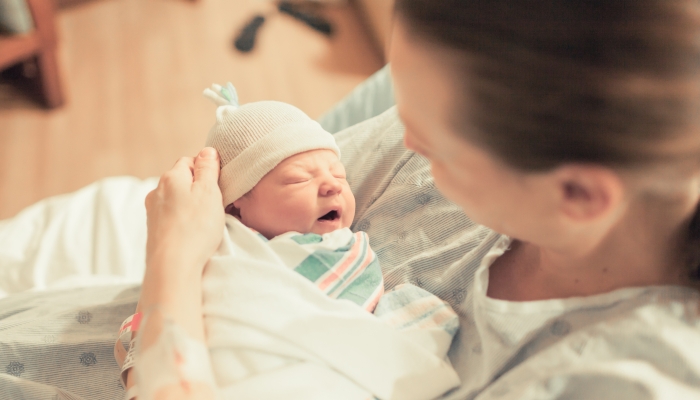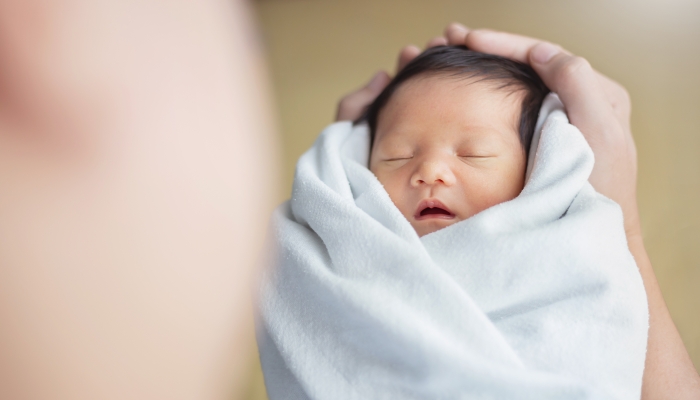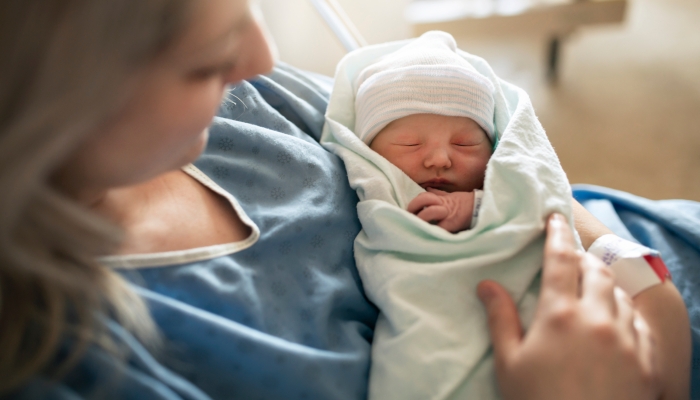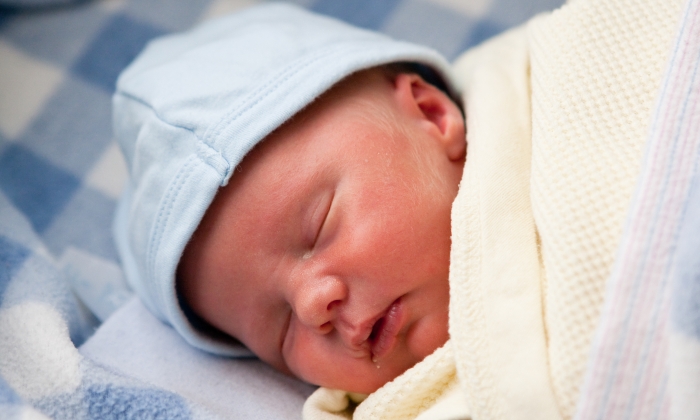Sleep Regimen for Premature Babies: Special Considerations

- Premature babies are all unique, so there’s no one-size-fits-all approach to sleep for premature babies.
- Your baby’s sleep habits will be impacted by how early they were born and whether they have any additional health concerns.
- Life is tough for the parents of premature babies, who often find the offers of help dry up as soon as their babies come home from the hospital.
- Introducing a bedtime routine can help your baby develop sleep associations that will encourage easier bedtimes in the future.
All new parents are tired, but parents of premature babies are on a whole other level of tired. Bringing your baby home from the hospital should be exciting, but for many neonatal intensive care unit (NICU) parents, it’s hugely daunting, too.
Premature babies often spend more time asleep than babies born at term. This sleep, however, is often inconsistent and unpredictable, so you’re likely desperate to know when your premature baby will sleep through the night. Many premature babies sleep more during a 24-hour period, but this will probably be dozing rather than long stretches of sleep.
Your preemie sleep schedule will depend on your baby’s unique circumstances. The earlier your baby is born, the longer it may take them to develop a sleep routine. For example, premature babies may not sleep for six-hour stretches until they are 6 to 8 months old.
This can be tough on the parents, who are likely exhausted from meeting their baby’s needs throughout the day and night. Be sure to reach out to friends and family for support, and be gentle with yourself.
Crafting a Specialized Sleep Regimen

There is no such thing as a set sleep schedule for premature babies because they all have different needs. Your baby’s needs will depend upon their prematurity, their development, and any health conditions they may have.
The following tips will help you create a bedtime routine for your baby:
Sleep Environment
Time in the NICU can impact your baby’s sleep even after they have been discharged. A 2020 article published in Nursing for Women’s Health11. Park, J.. Sleep Promotion for Preterm Infants in the NICU. Nursing for Women’s Health. 2020;24(1), 24–35. https://doi.org/10.1016/j.nwh.2019.11.004 found that “Preterm infants in the NICU are exposed to noxious stimuli that can frequently disrupt or shorten their sleep periods. Increasing evidence suggests that sleep quality is essential for the development of the central nervous system and is associated with long-term neurodevelopment.”
Now that your baby is home, you’ll want to take some steps to create the peaceful sleep environment that was likely missing in the hospital. Here are some things to consider when it comes to your baby’s sleep environment:
Temperature:
Premature babies are less able to regulate their own temperatures, meaning your baby is at an increased risk of getting too warm or cold during the night. These temperature changes could disrupt your baby’s sleep, so it’s essential to dress your premature baby appropriately.
The best way to help your baby stay at a comfortable temperature is to dress them in layers. You can easily remove the top layer if your baby is too warm at night.
Light and sound:
Newborn babies don’t know the difference between night and day because they have not yet developed the circadian rhythm or internal clock that tells us when to feel sleepy.
One of the most important steps to encourage premature baby sleep is gently teaching your baby the difference between night and day. Though it may be some time before your baby can sleep through the night, you can help them understand that nighttime is for sleeping by changing your behavior.
Our natural circadian rhythm depends on daylight, which is why it can be disrupted by bright indoor lighting late into the night. If you want to teach your baby to sleep at night, you first need to teach them what nighttime is.
A 2016 study published in the Journal of Behavioral and Developmental Pediatrics22. Schwichtenberg, A. J., Christ, S., Abel, E., & Poehlmann-Tynan, J. A.. Circadian Sleep Patterns in Toddlers Born Preterm: Longitudinal Associations with Developmental and Health Concerns. Journal of Developmental & Behavioral Pediatrics. 2016;37(5), 358–369. https://doi.org/10.1097/dbp.0000000000000287 found that introducing regular sleep habits was important for premature babies. Dim the lights, speak quietly, and avoid the glare of electronics during night time hours so your baby learns that night time is for resting.

Sleep Scheduling
One of the most important things to remember when thinking about your baby’s sleep is your baby’s adjusted age. Don’t fall into the trap of comparing your baby to their full-term peers and then feeling bad about your baby’s sleep. Remember, your baby has been busy playing catchup since birth, and it will take a while for your baby’s sleep pattern to sort itself out.
As you have probably already realized, it’s difficult to assemble a list of typical milestones for a premature baby. Premature babies are unique, and their development will depend on several factors, including how early your baby was born and whether they have any additional health concerns.
The best people to speak to about your baby’s sleep are their medical team. They will be able to advise you on what to expect and how you can gently help your premature baby sleep better at night.
The worst people to speak to about your baby’s sleep are parents of full-term babies the same age as your baby. They will likely have better sleepers than you and won’t understand the unique challenges facing your little fighter.
Premature babies sleep a lot, but usually not for long stretches, which makes it difficult for their parents to get enough sleep. Unfortunately, it may take a while before your baby sleeps through the night. It will get easier as your baby grows, and one day, you will have eight uninterrupted hours of sleep. One day.
Until then, all you can do is gently nudge your baby towards sleeping and grab sleep where you can.
Self-Soothing
Your baby will learn how to self-soothe over time; it’s not really something you can teach. When your baby first comes home, you’ll likely offer help each time your baby stirs in the night. You may find you wake them sometimes because they weren’t fully awake when you heard them stir.
As your baby grows, however, and you learn their cues, you’ll be comfortable waiting a few minutes to see whether they need help before intervening.
Sleep Safety
Premature babies and babies of low birth weight are at an increased risk of sudden infant death syndrome (SIDS), so you’ll need to follow safety advice carefully. When your baby was in the NICU, they were under constant supervision and likely slept in ways that would be considered unsafe at home. For example, wearing hats, sleeping in a nest, and having blankets in the crib are all considered unsafe at home but may have been allowed in the NICU.
Once your baby is home, you must follow safe sleep advice, even if it means changing things your baby was used to. The hospital team should have prepared your baby for safe sleep techniques before discharge.
According to a 2021 article published in the journal Pediatrics33. Goodstein, M. H., Stewart, D. L., Keels, E. L., & Moon, R. Y.. Transition to a Safe Home Sleep Environment for the NICU Patient. Pediatrics. 2021;148(1). https://doi.org/10.1542/peds.2021-052045, many babies are swaddled in the NICU, and this is something parents often choose to continue at home.
It’s unsafe for babies to be swaddled at night once they have started to try to roll over; the timing of this will vary between premature babies. It’s essential to ensure your baby’s hips are in the flexed position and that movement is possible, as this will allow for healthy development.
Sleep Monitors for Premature Babies
After growing used to the beeps and reassurance offered by the hospital machines, arriving home to a machinery-free life can be a shock. You may worry about your baby during the night without the comfort of a monitor to tell you everything is OK. Luckily, there are monitors on the market that can alert you if your baby’s breathing slows or if something is wrong.
Nutritional Considerations

Premature babies need to grow, so they feed often. This will likely disrupt their sleep, but feeding them on demand is important to ensure they get the nutrients necessary for healthy growth. When your baby is older, consider introducing a feeding schedule that compliments their sleep pattern. With a younger baby, however, you want to focus on offering night feedings as necessary.
If you’re breastfeeding, you should bear in mind that breastmilk composition changes during the day. Night feeds are often higher in fats, so many babies feed frequently at night and benefit from the extra fat.
If your baby needs medication during the night, you’ll need to plan this into their sleep schedule. Try to plan the medication times to fit around your baby rather than the other way around.
If you’re trying to teach your baby the difference between night and day, you’ll need to bear this in mind when administering medication. Avoid harsh lighting, loud voices, and playful interactions, and instead keep things calm when doing nightly meds.
If you’re struggling for sleep, ask your partner to take responsibility for the night feeds. If you’re breastfeeding, you can express milk for your partner to offer to your baby in the night. Being a premie mom is tough, especially when you’re tired, so make sure you’re leaning on your support system for help. The challenges don’t stop when your baby leaves the NICU, so you’ll need a support system in place to help.
Partnering with Healthcare Providers

You are the expert when it comes to your baby, but their healthcare providers are a close second. Ensure you attend your baby’s regular check-ups and always take a list of questions. It can be tricky to get healthcare advice for your premature baby because all premature babies are different. Still, a medical professional can offer tailored advice based on your baby’s medical history.
The Unique Needs of Premature Babies
According to the American Academy of Pediatrics (AAP), you should expect your premature baby’s sleep44. Preemie Sleep Patterns. HealthyChildren.org. 2015. https://www.healthychildren.org/English/ages-stages/baby/preemie/Pages/Preemie-Sleep-Patterns.aspx to develop later than their full-term peers. While a baby born at full-term may sleep for a six-hour stretch at 4 months, it may take a premature baby twice as long to accomplish that task.

Physical Development
Premature babies may have underdeveloped spinal cord and brains, which can put them at an increased risk of sleep apnea. Your baby’s medical team may be able to provide a sleep apnea machine or oxygen monitor to ensure your baby is safe during the night. Many babies outgrow sleep apnea by their due date, though some babies require monitoring at night for a little longer.
Skin Sensitivity
Premature babies have very delicate skin. Premature diapers are not only smaller but they’re also designed to be gentler on your baby’s skin. When choosing bedding, you should look for soft cotton bedding and night clothes for your baby. Harsh fibers such as wool and artificial fibers may irritate your baby’s skin.
Digestive System
Premature babies may have trouble digesting and regulating nutrients. Your baby may also require additional supplements to aid their development. Your pediatrician will closely monitor your baby’s growth and nutritional needs to ensure they are getting everything they need to support healthy development.
Neurological Development
It takes longer for a premature baby’s brain to develop because they are playing catchup for the missed time in the womb. Brain development has an important role in sleep because sleep cycles depend on brain development. There is a lot of waiting involved in helping your child develop healthy sleep patterns. Consistency is crucial, but so is patience. Your baby will get there, but it may take a while.
Sensory Sensitivities
Premature babies may be sensitive to sensory input. Bright lights, noise, and movement may be overwhelming for your baby. For this reason, creating a calm sleep environment for your little one is imperative.
Sleep and Healthy Development

Sleep has a vital role to play in healthy development. Knowing that, however, can make parents of premature babies feel bad about their baby’s sleep habits. Remember, all you can do is be patient, provide gentle encouragement, and continue to teach your baby healthy sleep habits. You can’t force your baby to sleep, but you can establish a sleep environment and routines where sleep may come more easily.
New parenthood is always challenging at first, but caring for a premature baby can feel all the more daunting. You may find yourself feeling overwhelmed when you first bring your premature baby home from the hospital. After all that time in the NICU, it can be scary to be on your own at last.
Don’t be afraid to reach out for help. Lean on everybody you can to make life easier for you and your beautiful baby as you adjust to your new life.
References
- Park, J. (2020). Sleep Promotion for Preterm Infants in the NICU. Nursing for Women’s Health, 24(1), 24–35. https://doi.org/10.1016/j.nwh.2019.11.004
- Schwichtenberg, A. J., Christ, S., Abel, E., & Poehlmann-Tynan, J. A. (2016). Circadian Sleep Patterns in Toddlers Born Preterm: Longitudinal Associations with Developmental and Health Concerns. Journal of Developmental & Behavioral Pediatrics, 37(5), 358–369. https://doi.org/10.1097/dbp.0000000000000287
- Goodstein, M. H., Stewart, D. L., Keels, E. L., & Moon, R. Y. (2021). Transition to a Safe Home Sleep Environment for the NICU Patient. Pediatrics, 148(1). https://doi.org/10.1542/peds.2021-052045
- Preemie Sleep Patterns. HealthyChildren.org. (2015, November 21). https://www.healthychildren.org/English/ages-stages/baby/preemie/Pages/Preemie-Sleep-Patterns.aspx

Related Posts

Eye Conditions and Syndromes, Visual Impairment
Neuralink Announces Plans to Restore Sight to the Blind with Brain Chip
Elon Musk’s company Neuralink has announced plans to begin human trials of its new “Blindsight” brain chip by the end of 2025.

Special Needs
5 Spring Cleaning Tips for Families of Children with Disabilities
Spring cleaning is an opportunity to create a more accessible, organized, and supportive space for your child with disabilities. Declutter, deep clean, and refresh!

Visual Impairment
The Gift of Understanding: How a Young Child Helps His Blind Father Navigate Life
When a parent is blind, it’s natural for people to wonder how their sighted child will adapt. Will they struggle to understand their parent’s needs? Will they feel burdened by...